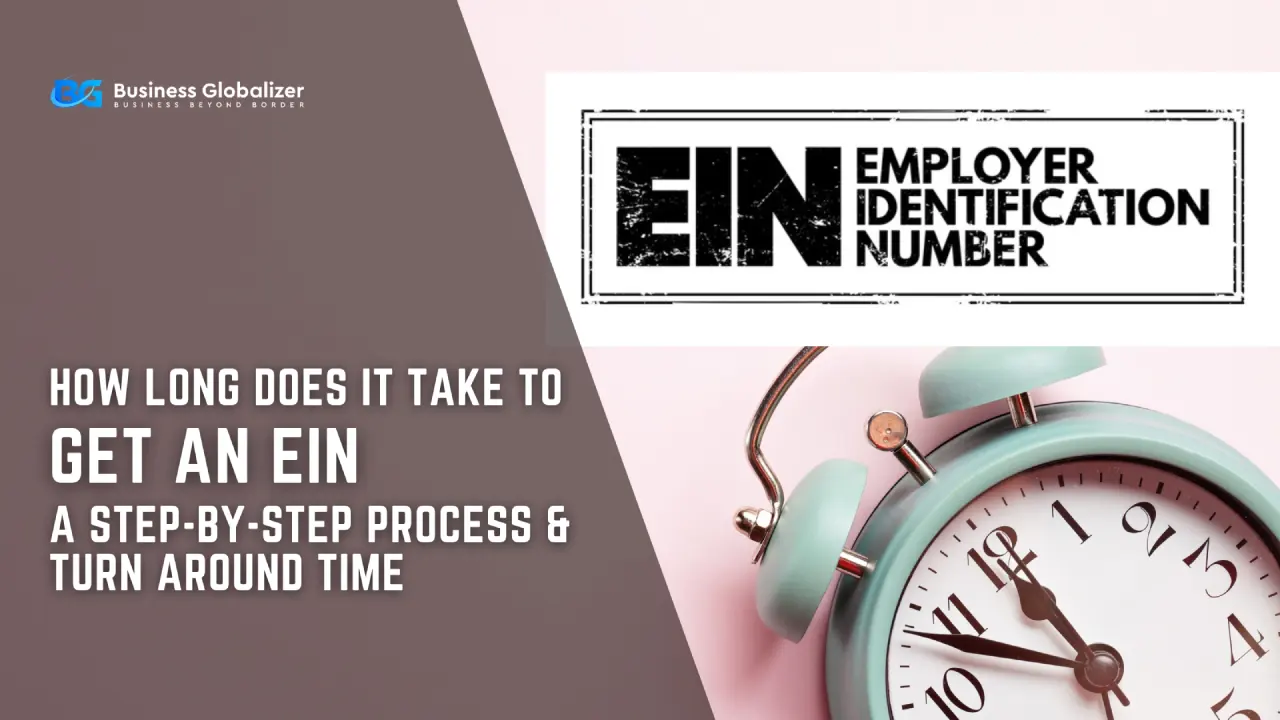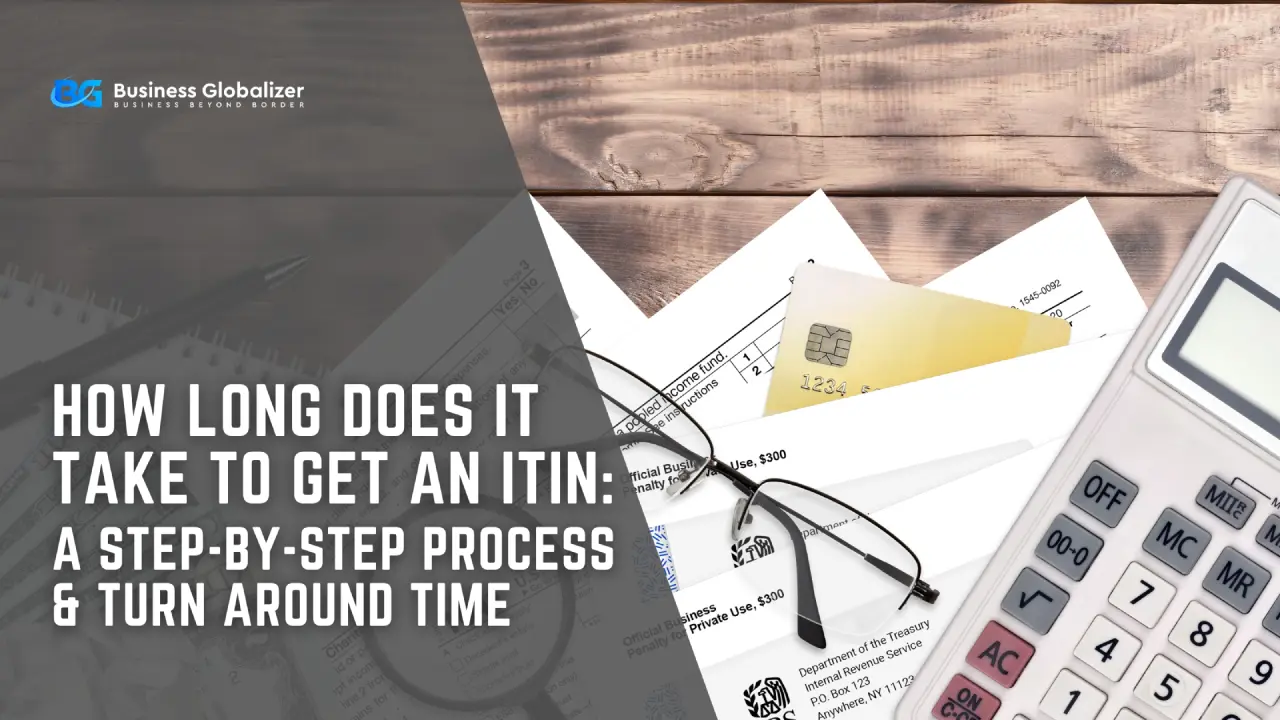In the United States, just as people have social security numbers, businesses have Employer Identification Numbers (EIN). This is a unique nine-digit number given by the IRS, like a business’s ID. You need it to do important things like pay taxes, run payroll, or open a business bank account.
Whether starting a new business or managing certain legal matters as a resident or a non-resident in the United States, you’ll likely need an EIN.
Let’s learn more about what it is and what’s the purpose of EIN.
What Is EIN?
An EIN, which stands for Employer Identification Number, is like a social security number for businesses in the United States. It’s a unique nine-digit code issued by the Internal Revenue Service (IRS) to identify business entities for tax purposes.
EINs are used primarily to report employment taxes, but they’re also essential for various other business activities, such as opening a business bank account, hiring employees, and filing tax returns. Essentially, if you’re running a business in the U.S., you’ll likely need an EIN.
Example of EIN
In understanding the following concept, let’s consider a practical EIN example:
Imagine Sarah, a budding entrepreneur with a passion for baking. She decides to turn her hobby into a business by opening a small bakery in her neighborhood. To formalize her venture “Sweet Treats Bakery”, Sarah applies for an EIN from the Internal Revenue Service (IRS).
Upon completing the application process, the IRS assigns “Sweet Treats Bakery” a unique nine-digit EIN: 12-4365789. This number now serves as the bakery’s official identifier for all tax-related and administrative purpose
With her newly acquired EIN, Sarah can now embark on various business activities. She uses her EIN to register her bakery with local authorities, open a business bank account, and secure the necessary permits and licenses.
When it comes time to hire staff, Sarah provides her EIN to prospective employees for tax and payroll purposes. The EIN allows her to withhold taxes, report employee wages, and fulfill her payroll tax obligations accurately.
As her bakery grows, Sarah relies on her EIN to expand her operations. She uses it to apply for business loans, establish vendor relationships, and file taxes with the IRS.
Who Needs an EIN?
But who exactly needs an EIN? Well, the answer is quite broad. Let’s learn:
- Corporations: Corporations are legally separate entities responsible for their obligations and debts. Thus, they require their own EIN.
Additionally, existing corporations may need a new EIN if there are changes in business structure, such as name changes, becoming a subsidiary, or transitioning to a sole proprietorship or partnership. - Partnerships: Most partnerships require EINs, except for certain joint ventures solely for sharing expenses. Changes in a partnership structure, like one partner establishing a sole proprietorship, incorporation, or formation of a new partnership, may necessitate obtaining a new EIN.
- Limited Liability Companies (LLCs): LLCs with two or more members can choose to be recognized as partnerships or corporations but still need their own EIN. Single-member LLCs might not require an EIN unless they have employees or declare bankruptcy.
- Sole Proprietorships: While most sole proprietors don’t need EINs, they may choose to obtain one, especially if they have employees or for bankruptcy purposes, and open a business bank account.
- Trusts: Certain types of trusts, including irrevocable trusts, custodianships, and receiverships, require EINs. Trustees or fiduciaries apply for EINs for trust entities.
- Estates of Deceased Persons: An EIN may be needed for the estate of someone who has died. This is usually needed when there are assets that need to be officially probated before they can be given out.
- Personal Service Corporations: Businesses primarily providing personal services like accounting, consulting, or legal services require EINs.
- Tax-Exempt Organizations: Nonprofit organizations must obtain an EIN before applying for tax-exempt status.
- Household Employers: Individuals employing household help or acting as agents for household employers need EINs for reporting payroll tax withholding.
- Individual Bankruptcy: Bankruptcy estates created under Chapter 7 or Chapter 11 require EINs. Married couples filing jointly each need an EIN.
- Real Estate Mortgage Investment Conduits (REMICs): These organizations, treated as partnerships by the IRS, need EINs.
Therefore, obtaining an EIN is essential for various entities and situations to ensure compliance with tax regulations and legal requirements, facilitating smooth operations and financial transactions.
When Are They Needed?
But when exactly are these EINs needed? EINs are necessary, especially if
- You’re planning to hire employees.
- Opening a business bank account.
- Filing tax returns.
- If your business deals with IRS reporting or financial institutions, an EIN is a must-have.
- If you are a sole proprietor and want to separate your business finances from your personal finances.
- Possess a business that becomes a multiple-member LLC regardless of the tax structure you decide on.
- Own an LLC with just a single member that elects to be taxed as a C or S corporation.
- To comply with the withholding laws of the IRS.
- To operate the business as a corporation or partnership.
- You are a non-resident alien filing a US tax return.
- For obtaining specific licensing purposes.
Additionally, an EIN might be necessary for employee benefit plans including health a retirement plans (like a Keogh plan).
What Is the Purpose of EIN?
So, what exactly is the purpose of this EIN?
An Employer Identification Number (EIN) serves several key purposes for your business, acting like a social security number but specifically for business entities.
Let’s delve into its vital functions:
- Tax Identification: The primary purpose of an EIN is for tax purposes. It allows the IRS to easily identify your business when you file tax returns, report income, and pay employment taxes. Without an EIN, you might encounter difficulties fulfilling your tax obligations or opening accounts for business tax payments.
- Establishing Business Legitimacy: An EIN helps establish your business as a separate legal entity from your personal finances.
This is particularly important for corporations, partnerships, and businesses with employees. It can be necessary for opening business bank accounts, applying for licenses and permits, or building business credit. - Hiring Employees: If you plan to hire employees, you’ll need an EIN to report payroll taxes and withhold income taxes from their wages. The IRS uses this information to track employee earnings and social security contributions.
- Opening Business Accounts: Many banks require an EIN to open a dedicated business bank account. This separation keeps your business finances organized and simplifies record-keeping.
- Certain Non-Business Needs: Even sole proprietors who don’t have employees might benefit from an EIN. It can be necessary for specific situations like opening a retirement plan (Keogh plan) or dealing with certain tax forms.
Non-resident aliens filing US tax returns on US-source income may also require an EIN.
In essence, an EIN is a crucial tool for businesses of all sizes. It facilitates tax compliance, establishes your business identity, and allows you to operate more efficiently.
Advantages of Employer Identification Number (EIN)
Now you know the purposes of EIN but why exactly should every business, regardless of its size, prioritize obtaining an EIN?
Despite not being mandated for all businesses, obtaining an EIN can offer numerous advantages and opportunities. Here’s why you may want to consider getting one:
- Identity Protection: An EIN shields your personal information by keeping your social security number (SSN) private. This can help protect against identity theft, ensuring that vendors and customers use your EIN for credit information and payments.
- Professionalism: Having an EIN adds professionalism to your business, signaling to clients and vendors that you’re serious about your venture. It gives your company gravitas and distinguishes it from a mere side hustle.
- Business Taxes: EINs make it easier to file federal and state taxes, especially for small businesses and sole proprietorships. Separating business and personal accounts may offer tax benefits and streamline financial management.
- Separation of Personal and Business Finances: An EIN is crucial for separating personal and business finances, particularly if you have employees. It ensures proper payment of payroll taxes and helps maintain clear financial records.
- Licenses: Businesses requiring licenses need an EIN to provide state and local authorities with the necessary information and verify compliance with regulations.
- Business Growth: An EIN is essential for banking transactions, including applying for loans, which can fuel business growth. It also helps establish credit for your business, improving your chances of securing favorable loan rates.
- International Business: Even if you’re overseas, an EIN can help you conduct business in the United States.
- Establish Credit: Building a strong credit profile is essential for accessing financing and favorable loan terms. An EIN serves as a gateway to establishing commercial credit, enhancing your business’s financial standing.
- Foreign Nationals: EINs are necessary for foreign nationals doing business in the United States, enabling them to apply for credit, open business accounts, and hire workers.
- Retirement Plan: Securing your financial future requires careful retirement planning. With an EIN, even self-employed individuals can establish retirement accounts, ensuring a comfortable future beyond their entrepreneurial endeavors.
- Asset Protection: In the unfortunate event of business insolvency, an EIN helps safeguard personal assets from potential losses. It provides a crucial layer of protection for business owners.

Why Do I Need an EIN as a Non-resident?
Now, let’s address a common query: why do non-residents need an EIN?
No matter whether you are a resident or a non-resident in the United States, an EIN is an important tool to have. Here’s why:
- Facilitating Business Transactions: An EIN serves as a unique identifier for your business activities in the United States, enabling smoother transactions with clients, vendors, and financial institutions.
- Opening Business Accounts: Many banks require an EIN to open a business bank account, allowing you to manage your finances efficiently and separate personal and business funds.
- Hiring U.S. Workers: If your business operations require hiring employees in the United States, having an EIN is essential for tax reporting and compliance purposes.
- Establishing Credit: Building a credit history for your business is vital for accessing financing and securing favorable terms with vendors and creditors. An EIN is necessary for establishing a commercial credit profile, and boosting your business’s financial credibility.
- Tax Compliance: Whether you’re generating income from U.S. sources or conducting business activities within the country, obtaining an EIN ensures compliance with U.S. tax regulations and facilitates the filing of tax returns.
- Planning for Retirement: Non-residents engaged in business activities in the United States can also benefit from retirement planning options such as Keogh or Solo 401(k) plans, accessible with an EIN and offering potential tax advantages.
In summary, acquiring an EIN as a non-resident opens doors to a myriad of opportunities. With Business Globalizer, you can apply for an EIN efficiently and ensure compliance with IRS regulations.
When You Need a New EIN from the IRS?
If your business undergoes certain changes in ownership or structure, you’ll likely need to obtain a new Employer Identification Number (EIN) from the Internal Revenue Service (IRS).
For instance, if your business shifts from a sole proprietorship to a partnership by adding a partner, or if a partnership decides to incorporate, a new EIN application is necessary. Similarly, if a corporation transitions to a sole proprietorship or partnership, a new EIN is required.
However, you typically don’t need a new EIN for changes like altering your business’s name or location or choosing to be taxed as an S corporation.
In case you are not sure if the changes to your business require a new EIN application, you should contact the IRS or talk to a professional legal expert. Or you can directly purchase an EIN with proper compliance.
FAQs
Q1: If I have an EIN do I need to file taxes?
Answer: Having an EIN doesn’t automatically exempt you from filing taxes. The need to file taxes depends on various factors, including your business structure, income, and other financial activities.
Q2: How to find an employer identification number?
Answer: To find an Employer Identification Number (EIN), you can check various documents associated with your business, such as tax returns, business licenses, or incorporation paperwork. If you still can’t locate it, you can contact the IRS Business & Specialty Tax Line at 800-829-4933.
Q3: Can I own more than one EIN?
Answer: No, you generally cannot own more than one EIN for a single business entity. The IRS intends for EINs to be unique identifiers for each business. If you operate multiple separate businesses, you can obtain a unique EIN for each one.
Final Words
In summary, an EIN is not just a number. The purpose of the EIN is multifaceted and essential for businesses of all sizes. While an EIN may not be required for every business, its benefits extend far beyond mere compliance, enhancing privacy, credibility, and operational efficiency.





